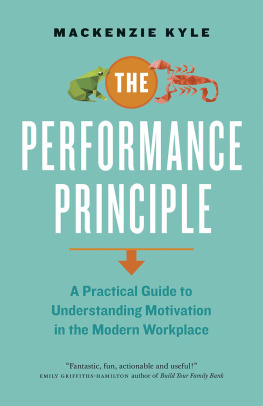The New Shop Floor Management
EMPOWERING PEOPLE FOR CONTINUOUS IMPROVEMENT
Kiyoshi Suzaki

The Free Press
New York

The above Kanji characters are pronounced as Gen Ba Kan Ri or, in short, Genba Kanri. Here, the first symbol, Gen, means reality as well as symbolizes the movement of appearing; whereas Ba, the second symbol, means space. Thus, Genba represents the place where the reality exists or shows upwhether good or bad. Then, the following symbol, Kan, means to administer, and Ri means natural law. Thus, Kanri is to administer by following the law of nature.
Recognizing that all of us will be better off if we squarely face and deal with the issues at where the action is, i.e., the shop floor, this book addresses the importance of shop floor management from a new, fresh viewpoint.
(Calligraphy by the author.)
For those who light up
the corners of the world.
CONTENTS
Changing Our Destiny
Developing a Mission for Mini-Companies
Upgrading Our Skills
A Case of Continuous ImprovementMy Fingers Hurt
Developing the Rhythm of PDCA
Evaluating the Level of Shop Floor Management
APPENDICES
Appendix 1.1 Employee Survey
PREFACE
As the worlds business climate changes, it is getting more difficult for us to remain competitive. Customers demand changes, technology changes, and competitive forces change. In a word, our environment has become very turbulent.
Even though the challenges we face today are enormous, we can still address issues that are within our controlfrom the shop floor up. Keys to meeting todays challenges for any organization include:
Shared vision
Customer orientation
Ownership by people
Problem solving at the source
Self-management
Quality in all business processes
This book will address these topics by:
Sharing the importance of shop floor management
Providing the ideas, techniques, concepts, and philosophy necessary to practice better shop floor management
Illustrating how these are applied in different companies
Encouraging readers to take significant steps toward continuous improvement that involve everybody
Upgrading skills and deepening the insights for self-management to maximize everybodys potential
In other words, rather than viewing the shop floor only from the top down, this book attempts to address the organizations needs from shop floor up, presenting a new perspective of the shop floor and its linkage to the total organization. It also points out that just as doctors need to see their patients to make accurate diagnoses, todays managers need to be directly involved in shop floor activities in order to maximize their employees self-managing abilities.
Also, expanding the people-friendly techniques of continuous improvement that were described in my previous book, The New Manufacturing Challenge (The Free Press, 1987), the focus of this book is on people and management at the shop floor level. While the traditional specialist orientation may seek intellectual and sophisticated solutions, the emphasis here is on practice and integration of people-friendly techniques by making use of the collective wisdom of the people.
Critiques, questions, or suggestions about the book should be addressed to the author c/o Suzaki & Company, 1137 El Medio Avenue, Suite 101, Pacific Palisades, California 90272.
INTRODUCTION:
RETHINKING OUR SHOP FLOOR
Early this century, Frederick Taylor published a book titled Shop Management in which he recommended segregating the planning of work from its execution. As experts with skills such as time-and-motion studies proliferated, a big gap was eventually created between management and workers. Taylors intention was to find ways to give high wages to workers while maintaining low labor costs for the company, but his theories would later be challenged.
Many argue that Taylors belief that workers should be considered simply as extensions of machinery has strongly influenced Western management practices for many decades. Taking a look at such beliefs from a fresh vantage, this book will take a much more humanistic as well as holistic viewpoint in addressing the critical elements of shop floor management.
Most of us agree that if we can upgrade peoples skills, everyone is better off. As the skill level improves, there should be less fire fighting. More problems will be solved at the source, and smoother communication among people makes it possible to get things done more quickly. Only limited layers of management will be required to oversee activities on the shop floor.
In this book, we view the shop floor as the place where the most fundamental value-added activities take place, whether they are in manufacturing, services, or construction. Looking around, however, we still find many Tayloristic organizations. Even though more managers seem to believe in utilizing people to their maximum potential, the degree of their contribution is still very limited. Specific approaches for maximizing the potential of people at the shop floor have not yet been initiated.
This book will explore such potential by focusing attention on the shop floor. By taking a fresh view of the shop floor and trying to figure out ways to address problems there, we can develop an organization based on actual needs, rather than on a predetermined point of view. This enables us to focus on value-added activities and to empower people, thereby upgrading the foundation of the organization. By clarifying our vision, streamlining the process, and letting people manage themselves, we can realize tremendous improvements in quality, cost, delivery, safety, morale, and the organizations competitive position.
The existing gap between top management and the shop floor can also be narrowed. The company will benefit from the tremendous power of people with this new shop floor management, but it is my hope that people on the shop floor will also find this experience rewarding and exciting, leading to their own personal growth. Accordingly, even though we find ourselves living in a very turbulent world, I feel confident that each of us will find a clear path through it.
REVISITING OUR SHOP FLOOR
One of the major focuses of this book is self-management of people on the shop floor. The shop floor is a foundation of our thinking; it provides a base for our societys growth. The Japanese call shop floor management genba kanri. The shop floor (genba) is revered as the place where people ultimately add value to their society and strengthen its foundation.
Whether the activities are in manufacturing (tightening nuts), construction (hammering nails), or service (processing information), each step is crucial (see ). Without them, our society will simply disintegrate. Furthermore, since people who are engaged in activities on the shop floor make up a very large part of our society, they represent not only the producers of value but the customers as well.
We can also see that the shop floor is where many of us start our careers by learning to get things done, to solve problems, and to work with others. Furthermore, many of us spend the majority of our working careers on the shop floor or dealing with issues relating to the shop floor.
Yet, as the worlds business environment changes, people on the shop floor and their families are often the most vulnerable ones in terms of the impact of change on their livelihood.









